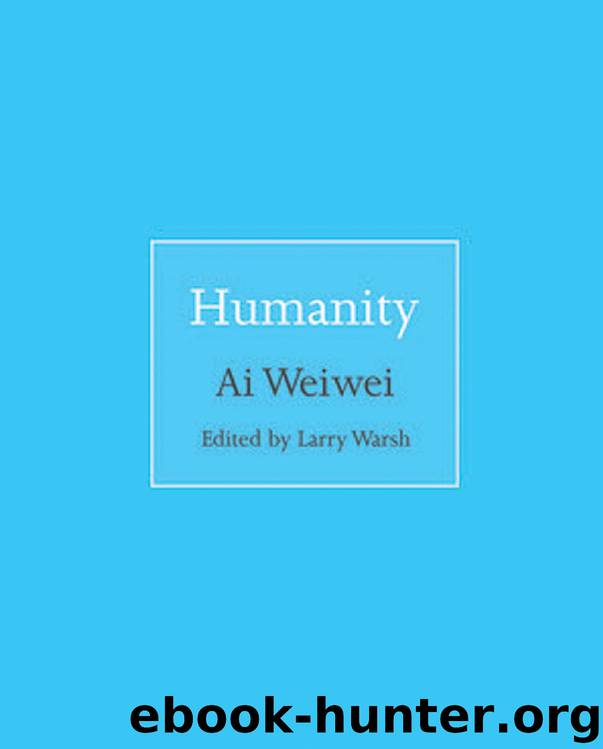Humanity by Ai Weiwei

Author:Ai Weiwei [Weiwei, Ai]
Language: eng
Format: epub
ISBN: 9780691181523
Publisher: Princeton University Press
Published: 2018-04-24T04:00:00+00:00
CHRONOLOGY
1910
Ai Qing, Ai Weiwei’s father, is born in Zhejiang Province on March 27.
1911–1949
The Xinhai Revolution overthrows the Qing dynasty in 1911, ending two millennia of imperial rule. The Republic of China is founded; Sun Yat-sen (1866–1925) is elected its first provisional president on December 29, 1911. A period of instability follows, including an attempt to revive the monarchy, the Warlord Era, the Second Sino-Japanese War, and the Chinese Civil War between the Nationalists and the Chinese Communist Party.
1929–1932
Ai Qing studies painting in Paris and discovers a love for poetry.
1932–1935
Ai Qing returns to China and joins the League of Left-Wing Writers in Shanghai. Imprisoned for three years by the Nationalists, he nonetheless writes and publishes poetry.
1941–1943
Ai Qing meets Mao Zedong (1893–1976). Mao organizes the Yan’an Forum on Art and Literature and delivers a seminal speech on the relationship between art and politics. Ai Qing joins the Chinese Communist Party in 1943.
1949
The Chinese Communist Party, led by Mao, takes control of mainland China and establishes the People’s Republic of China on October 1.
1956–1957
The Chinese Communist Party encourages citizens to express opinions and openly criticize national policies, a period of liberalization subsequently known as the Hundred Flowers Campaign.
1957
Ai Weiwei is born in Beijing on May 18, to Ai Qing and his wife, Gao Ying (1934–).
1957–1959
The Anti-Rightist Movement (1957–1959) immediately follows the Hundred Flowers Campaign. Hundreds of thousands of intellectuals are persecuted on allegations of “rightism” and face punishments ranging from public criticism to exile.
Ai Qing is denounced as a rightist and exiled to Beidahuang, Heilongjiang Province, in northeast China together with his family. They are transferred to Shihezi, Xinjiang Province, in northwest China in 1959.
1966–1976
Mao initiates the Great Proletarian Cultural Revolution in May 1966, aiming to enforce Communism by removing capitalist, traditional, and cultural elements from Chinese society. Millions are accused of participating in “bourgeois” activities, suffering public humiliation, imprisonment, torture, seizure of property, and various forms of harassment. Numerous historic sites and cultural artifacts are destroyed.
Ai Qing is sent away to a rural region of Xinjiang Province to undergo further thought-reform through hard labor. He and his family return to Beijing in 1975.
1976
Mao passes away at the age of eighty-two on September 9. Thereafter, the political faction known as the Gang of Four is arrested, marking the end of the Cultural Revolution.
1978
Reinstated as leader of the Chinese Communist Party, Deng Xiaoping (1904–1997) promotes economic reform and “opening up” to the outside world, driving China toward a market-oriented economy. Although China reopens its doors to the world, the political regime remains a dictatorship, maintaining strict social and media control.
Ai Weiwei enrolls at the Beijing Film Academy and studies animation as part of the first class of students admitted after the Cultural Revolution.
1979
Rehabilitated, Ai Qing becomes a vice-chairman of the China Writer’s Association.
Ai Weiwei is a founding member of the Stars, the first movement to break away from the official aesthetic policies of the Chinese Communist Party. The first Stars exhibition takes place outside the National Art Museum.
1981–1982
Ai Weiwei studies English in the United States, in Philadelphia, Pennsylvania, and then in Berkeley, California.
Download
This site does not store any files on its server. We only index and link to content provided by other sites. Please contact the content providers to delete copyright contents if any and email us, we'll remove relevant links or contents immediately.
| Arms Control | Diplomacy |
| Security | Trades & Tariffs |
| Treaties | African |
| Asian | Australian & Oceanian |
| Canadian | Caribbean & Latin American |
| European | Middle Eastern |
| Russian & Former Soviet Union |
The Secret History by Donna Tartt(19089)
The Social Justice Warrior Handbook by Lisa De Pasquale(12190)
Thirteen Reasons Why by Jay Asher(8910)
This Is How You Lose Her by Junot Diaz(6887)
Weapons of Math Destruction by Cathy O'Neil(6281)
Zero to One by Peter Thiel(5802)
Beartown by Fredrik Backman(5754)
The Myth of the Strong Leader by Archie Brown(5508)
The Fire Next Time by James Baldwin(5446)
How Democracies Die by Steven Levitsky & Daniel Ziblatt(5219)
Promise Me, Dad by Joe Biden(5153)
Stone's Rules by Roger Stone(5088)
A Higher Loyalty: Truth, Lies, and Leadership by James Comey(4964)
100 Deadly Skills by Clint Emerson(4925)
Rise and Kill First by Ronen Bergman(4789)
Secrecy World by Jake Bernstein(4753)
The David Icke Guide to the Global Conspiracy (and how to end it) by David Icke(4720)
The Farm by Tom Rob Smith(4513)
The Doomsday Machine by Daniel Ellsberg(4490)
